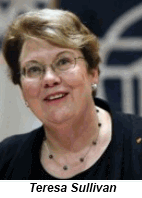|
News & Views item - June 2012 |
![]() A Necessary Condition for a Great Research University. (June 26, 2012)
A Necessary Condition for a Great Research University. (June 26, 2012)
Mark G. Yudof, the president of the 10-campus University of California system asks rhetorically: "Is it possible to be a successful president of a public university?" So reports the New York Times' Tamar Lewin.
And Professor Yudof continued: "Iím not willing to say these jobs are impossible, but these are very difficult times. You want to be more efficient, but you donít want to make changes so fast that you endanger academic values and traditions and alienate the faculty. But you canít go too slow, or you alienate the board and the legislature. Itís a volatile mix."
Ms Tamar then cites:
Richard W. Lariviere, the president of the University of Oregon, was fired in November, despite strong faculty support, after pushing aggressively for more independence from the state.
Carolyn Martin left the University of Wisconsin to become president of the far smaller Amherst College.
At the University of Illinois, a faculty mutiny helped spur President Michael Hoganís resignation after less than two years on the job.
The sacking of University of Virginia President Teresa Sullivan on June 10 by her board which "expressed dissatisfaction with the pace of change, including finding new revenue sources".
 This
last, according to The Washington Post, has led to: "Virtually every
conceivable campus constituency to mobilize in her defense, including students,
academic deans and rank-and-file faculty members." This has forced the board
that voted for an interim successor to Sullivan to meet later today to consider
giving her back her job.
This
last, according to The Washington Post, has led to: "Virtually every
conceivable campus constituency to mobilize in her defense, including students,
academic deans and rank-and-file faculty members." This has forced the board
that voted for an interim successor to Sullivan to meet later today to consider
giving her back her job.
Commenting on the overall situation of the increasing difficulties in leading US public universities Molly Corbett Broad, president of the American Council on Education says that while "[e]ach situation is a little different... the trend is apparent -- [t]he staggering reduction in financial support from the state puts a lot of pressure on campus. Thereís increasing politicization of governance. And there are rising expectations that universities will transform themselves very quickly, if not overnight. Somehow, theyíre supposed to achieve dramatic improvement in learning productivity and at the same time reduce costs by using educational technology."
In summary what appears to have been the
rationale for the sacking of Professor Sullivan was the university board's
perception that the world "is simply moving too fast" for the University of
Virginia to maintain its position "under a model of incremental marginal change"
such as being instituted by Professor Sullivan.
And here it is of interest to note the comments of Donna Shalala, US President Bill Clinton's Secretary of Health and Human Services, President of the public University of Wisconsin prior to becoming HHS secretary, and is the current President of the private University of Miami: "Everybody thinks university presidents are hierarchical and top-down, but we are not corporate chieftains, and we cannot rule from the sky. We are more like tugboat captains, trying to get our ships aligned and pulling them in the right direction."
She went on to tell Ms Lewin that the great research universities have achieved their dominant position in the world through shared faculty governance, and leaving faculty both academic and research considerable freedom in running their affairs.
Then perhaps somewhat ruefully: "It was a lot easier to run a cabinet department than the University of Wisconsin. There are a lot of different constituencies at a university, and the president cannot be successful without buy-in from all of them."
________________________
Note added belatedly, July 4, 2012: From The Washington Past June 27, 2012: "The University of Virginia governing board voted unanimously Tuesday to reinstate Teresa Sullivan as president, more than two weeks after board leaders had forced her to resign and unleashed a storm of campus upheaval. The two women at the center of the conflict, Sullivan and the board leader, Rector Helen E. Dragas, walked into the historic Rotunda in tandem for the meeting, a gesture of unity after a fortnight of division at Virginiaís public flagship university."